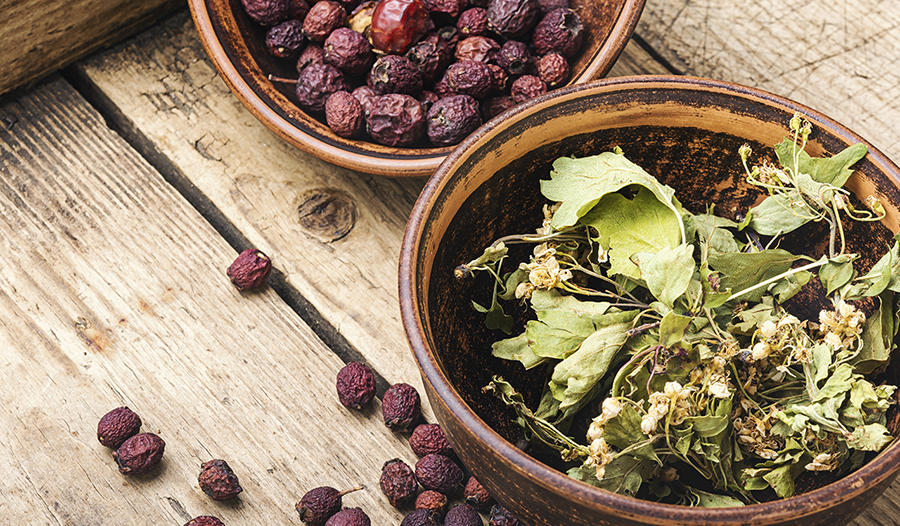2022'de Neden Her Yerde Alıç Göreceksiniz

Alıç Nedir?
Gül ailesinin bir üyesi olan alıç, küçük kırmızı, beyaz veya pembe çiçek kümeleri üreten dikenli, çiçekli bir ağaç veya çalıdır. Çeşitli alıç bitki türleri vardır; en yaygın olanı bilimsel adı Crataegus rhipidophylla'dır.
Şimdi bahçeniz için yeni bir çalı veya bir buket için çiçek aramıyorsanız, 2022'de neden her yerde alıç göreceğinizi merak edebilirsiniz.
Bitkinin yapraklarının, çiçeklerinin, meyvelerinin, saplarının ve hatta kabuğunun kalp sağlığı, sindirim ve daha fazlası üzerinde olumlu etkiler için sıklıkla bitkisel tıpta kullanıldığını bilmek sizi şaşırtabilir. Bu eski şifalı bitki, diyet takviyesi olarak birçok biçimde yaygın olarak bulunur. Alıçın göz önünde bulundurmanız gereken birçok sağlıklı ve pratik kullanımı vardır.
Kalp Sağlığı
Alıç Avrupa tıbbında bilinen en eski şifalı bitkidir. Genellikle “Farmakolojinin Babası” olarak anılan eski bir Yunan doktoru olan Dioscorides, alıçların birinci yüzyılda kalp üzerindeki eylemlerini tanımladı.
Geleneksel Çin Tıbbına (TCM) göre, alıç meyvesi bir kalp toniğidir ve son araştırmalar kardiyoprotektif özelliklerini göstermektedir.1
Alıç meyvelerindeki bitki besinleri, kalbiniz de dahil olmak üzere vücudunuzu korumaya yardımcı olmak için antioksidan etkiye sahip olabilir. Kan damarı duvarlarını güçlendirebilir, kan akışını artırabilir ve egzersiz toleransınızı artırabilirler.2
Memorial Sloan Kettering Kanser Merkezi, bilim adamlarının alıçların kalbin koroner arterlerinin düz kas astarının genişlemesine neden olduğuna inandıklarını bildirdi. Bu eylem, kan akışını artırarak kalbe fayda sağlar.
Alıç ayrıca kalp atış hızını, sinir iletimini, kalp kası kasılmasını ve kalp kası sinirliliğini artırabilir.
Yüksek Tansiyon
Çalışmalar, alıçların yüksek tansiyonu düşürmeye yardımcı olabileceğini düşündürmektedir.
2002 yılında yayınlanan bir çalışma, alıç özü ve magnezyum takviyelerinin, tek tek ve kombinasyon halinde, kan basıncını düşürmek için potansiyel kullanımını araştırdı.6
On hafta sonra, alıç alan 19 kişi (38 çalışma gönüllüsünden) diğer çalışma katılımcılarına kıyasla dinlenme diyastolik basıncında (kan basıncı oranının daha düşük sayısı) daha büyük bir azalma gösterdi.
Başka bir çalışma, reçeteli ilaç alan tip 2 diyabetli kişilerde alıçın yüksek tansiyon üzerindeki etkisine baktı.7 Araştırmacılar, diyabetli 79 hastadan oluşan bir grubu iki gruba ayırdı: biri 16 hafta boyunca günlük alıç özü alırken diğeri plasebo aldı.
Alıç alan çalışma katılımcıları, plasebo grubundakilere göre çok daha düşük diyastolik kan basıncı değerlerine sahipti.
Kalple İlgili Diğer Durumlar
Araştırmalar, alıç ekstraktının flavonoid ve pektin içeriği nedeniyle kan kolesterol seviyelerini iyileştirebileceğini ortaya koymuştur. (Pektin kolesterol metabolizmasında rol oynayan bir lif türüdür.)
Kolesterol seviyeleriniz dengesiz olduğunda, özellikle yüksek trigliseritler ve düşük HDL (iyi) kolesterol durumunda, ateroskleroz gelişebilir - kan damarlarınızda arterlerinizin sertleşmesine ve daralmasına neden olabilecek plak birikimi.
Ön hayvan çalışmaları, alıçların kolesterolü içeren kandaki yağ seviyelerini azaltmaya yardımcı olabileceğini ve aterosklerozun önlenmesine yardımcı olabileceğini düşündürmektedir.
- Altı haftalık bir çalışma, alıç meyvesi takviyeleri ile beslenen sıçanların açlık trigliseritleri ve LDL (kötü) kolesterol seviyelerini önemli ölçüde azalttığını gösterdi.8
- Aterosklerozlu 64 kişinin katıldığı altı aylık bir çalışma, alıç özü ve Çin bitkisi özü kombinasyonunun günlük olarak alınmasının karotis arterdeki zararlı plak birikiminin kalınlığını azalttığını buldu.9
İnsanlardaki faydaları doğrulamak için daha fazla araştırmaya ihtiyaç vardır.
Kaygı
Geleneksel tıp uygulayıcıları stres, anksiyete ve depresyon gibi belirli psikolojik durumlar için alıç kullanmışlardır.
Alıç ve magnezyumun kan basıncı üzerindeki etkisini araştıran araştırmacılar, alıç alanların diğer test gruplarına göre daha fazla kaygı azalması yaşadıklarını buldular.6
Bu arada, 2004 yılında yapılan bir çalışma, alıç özü, magnezyum ve California haşhaş çiçeği oluşumu verilen anksiyeteli 264 kişiyi içeriyordu.10 Hafif ila orta derecede kaygısı olan çalışma katılımcıları, plaseboya kıyasla anksiyete seviyelerinde önemli bir düşüş gösterdi. Bununla birlikte, bu çalışmanın alıçların tek başına oynadığı rolü özel olarak araştırmadığını belirtmek önemlidir.
Sindirim
2015 yılında Nutrients dergisinde yayınlanan eleştirel bir inceleme, şahinlerin (meyveleri, yaprakları ve çiçeklerinin) gastrointestinal hastalıkların ve diğer sindirim sorunlarının tedavisinde faydalı olduğunu buldu.11
Alıç meyvelerinde bulunan lif, prebiyotikgörevi görür. Bu nedenle, sağlıklı bir sindirim sistemini destekler çünkü prebiyotikler esasen probiyotikler için besin görevi görür. Bağırsaklarınızın “iyi bakterisi” olarak kabul edilen probiyotikler sindirim sisteminizde sağlıklı bir mikroorganizma dengesini korumaya yardımcı olur.
Ek olarak, hayvan çalışmaları alıç meyvelerinin yağlı ve protein açısından zengin gıdaları sindirmek için gereken enzimlerin aktivitesini artırabileceğini göstermektedir.12 Diğer hayvan araştırmaları, alıç ekstraktının sindirim sisteminizdeki yiyeceklerin geçiş süresini hızlandırabileceğini bulmuştur.13
Anti-inflamatuar Özellikler
Karaciğer hastalığı olan fareler üzerinde yapılan araştırmalar, alıç meyvesi ekstraktının enflamatuar bileşiklerin salınımını belirgin şekilde engellediğini, karaciğer iltihabını ve yaralanmasını azalttığını göstermiştir.14
Başka bir çalışmada, viteksinin solunum rahatsızlığı olan fareler üzerindeki etkisi incelenmiştir.15 Vitexin, alıç yapraklarında bulunan bir bileşiktir. Araştırmacılar, vitexin ile tedavi edilen farelerin iltihaplanmaya yanıt veren daha az beyaz kan hücresine sahip olduğunu ve iltihabı tetikleyen daha az protein ürettiğini buldular.
Hayvan ve diğer laboratuvar çalışmalarından elde edilen bu tür bulgular, alıç takviyesinin anti-enflamatuar faydalarının insanlar için de mevcut olabileceğini göstermektedir.
Serbest Radikallerle Mücadele
Vücut, sigara dumanı, hava kirliliği veya ultraviyole ışınları gibi çevredeki zararlı elementlere yanıt olarak serbest radikaller üretir. Bununla birlikte, serbest radikaller hücrelerinizde meydana gelen normal süreçlerin bir yan ürünü olarak da oluşturulur.
2015 yılında yayınlanan bir bilimsel literatür taraması Nutrients, alıç meyvelerinin önemli miktarda polifenol içerdiğini belirtti.16 Bu antioksidan bileşikler serbest radikalleri nötralize etmeye yardımcı olur. Araştırmacılar genellikle vücuttaki serbest radikallerin etkisini yaşlanma sürecinin yanı sıra kanser ve kronik hastalık gelişimine bağlarlar.
Mutfak Kullanımları
Alıç çiğ veya pişmiş olarak yenebilir. Avrupa ve Kuzey Amerika'da, genellikle reçel veya jölelerde korunur. Alıç, iyi koruyan güçlü bir tada sahiptir.
Asya kültürlerinde alıç, şeker ve içeceklerde popüler bir bileşendir. Tatlı ve ekşi tadı, onu bu tür kullanımlar için mükemmel bir seçim haline getirir.
Beslenme
Alıç, vücut üzerinde antioksidan etki gösterebilen rutin, kateşinler, saponinler, viteksin ve çeşitli antosiyanidinler ile birlikte önemli miktarda B vitamini ( folik asitdahil) içerir.
Eşsiz vitamin, mineral ve organik bileşik karışımı arasında alıç meyvesi şunları içerir:
- Demir
- Kolin
- Kalsiyum
- B1 Vitamini
- B2 Vitamini
- C Vitamini
- Kafeik asit
- Asetilkolin
- Klorojenik asit
- Fosfor
Dozaj ve Hazırlama
Alıç özü, tabletler, kapsüller ve tentürler gibi ticari preparatlarda satın alınabilir. ABD'de bulunan diğer alıç ürünleri arasında yapraklar, çiçekler ve meyveler bulunur.
İncelenen dozajlar günde 160 ila 1.800 miligram arasında değişmekte olup, 3 ila 24 haftalık bir süre boyunca iki veya üç doza bölünmüştür. Araştırmalar henüz en etkili dozu belirlememiş olsa da, daha yüksek dozların daha fazla terapötik etkinliğe sahip olduğu görülmektedir.
Alıçın etkilerini göstermesi biraz zaman aldığından, sizin için işe yarayıp yaramadığını belirlemeden önce en az dört ila sekiz haftalık bir denemeye ihtiyacınız olabilir.
Olası Yan Etkiler
Alıç genellikle güvenli olduğuna inanılır ve 16 haftaya kadar önerilen bir dozu alan çoğu insan tarafından iyi tolere edilir. En yaygın yan etkiler şunlardır:
- Vertigo ve baş dönmesi
- Bulantı ve diğer bağırsak semptomları
- Yorgunluk
- Terleme
- Baş ağrısı
- Çarpıntı
- Burun kanaması
- Ajitasyon
- Ruh hali değişimleri
- Nefes darlığı
- Şiddetli alerjik reaksiyonlar
Ve yüksek dozlarda alıç sedasyona ve çok düşük tansiyona neden olabilir.
Crataegus ürünlerine aşırı duyarlı olduğunuzu biliyorsanız alıç alıç almayın.
Hamilelik sırasında kullanılması tavsiye edilmez, çünkü potansiyel olarak uterus kasılmalarını uyarabilir. Alıç emzirme döneminde veya gençler arasında yeterince incelenmediğinden, çocuklar veya emziren anneler için önerilmez.
Alıç kardiyotonik etkiler göstermiş olsa da, özellikle kalp rahatsızlığınız varsa, bu amaçla denemeden önce sağlık uzmanınızla konuşmanız önemlidir.
Alıç takviyeleri beta blokerler, kalsiyum kanal blokerleri veya diğer kalp, kolesterol ve tansiyon ilaçları gibi ilaçlarla etkileşime girebilir. Alıç kan basıncını düşürebileceğinden, alıç tansiyon ilacınızla birleştirirseniz kan basıncınız çok düşebilir. Kan sulandırıcı kullananlar, alıç kanama riskini artırabileceğinden dikkatli olmalıdırlar.
Referanslar:
- Wu, M., Liu, L., Xing, Y., Yang, S., Li, H. ve Cao, Y. (2020). Alıç ve Ekstraktlarının Ateroskleroz Üzerindeki Rolleri ve Mekanizmaları: Bir İnceleme. Farmakolojide sınırlar, 11, 118.
- Orhan IE. Crataegus oxyacantha L. (Hawthorn) Fitokimyasal ve Farmakolojik Aktivite Profili - Kardiyotonik Bir Bitki. Curr Med Chem. 2018; 25 (37): 4854-4865.
- Pittler MH, Guo R, Ernst E. Kronik kalp yetmezliği tedavisi için alıç özü. Cochrane Veritabanı Sistemi Rev. 2008; (1): CD005312
- Pittler MH, Schmidt K, Ernst E. Kronik kalp yetmezliğini tedavi etmek için alıç özü: randomize çalışmaların meta-analizi. Ben J Med. 2003; 114 (8): 665—674.
- Zick SM, Vautaw BM, Gillespie B, Aaronson KD. Alıç Ekstresi Randomize Kör Kronik Kalp Yetmezliği (HERB CHF) denemesi. Eur J Kalp Başarısızlığı. 2009; 11 (10): 990-9.
- Walker AF, Marakis G, Morris AP, Robinson PA. Alıç ekstraktının umut verici hipotansif etkisi: hafif, esansiyel hipertansiyonun randomize çift kör pilot çalışması. Phytother Res. 2002; 16 (1): 48-54.
- Walker AF, Marakis G, Simpson E, vd. Reçeteli ilaçlar alan diyabetli hastalar için alıçın hipotansif etkileri: randomize kontrollü bir çalışma. Br J Gen Uygulaması 2006; 56 (527): 437-43.
- Diane A, Borthwick F, Wu S, Lee J, Brown PN, Dickinson TA, Croft KD, Vine DF, Proctor SD. JCR:LA-CP kemirgen dislipidemi ve kardiyak disfonksiyon modelinde yeni bir yabanmersini alıç meyve özünün hipolipidemik ve kardiyoprotektif faydaları. Gıda Fonksiyonu 2016 Eylül 14; 7 (9): 3943-52.
- Liu LT, Zheng GJ, Zhang WG, Guo G, Wu M. [Karotis aterosklerozunun polygoni cuspidati rhizoma et radix ve crataegi fructus ekstraksiyonu ile tedavisi üzerine klinik çalışma: randomize kontrollü bir çalışma]. Zhongguo Zhong Yao Za Zhi. 2014 Mart; 39 (6): 1115-9.
- Hanus M, Lafon J, Mathieu M. Hafif ila orta dereceli anksiyete bozukluklarında iki bitki özü (Crataegus oxyacantha ve Eschscholtzia californica) ve magnezyum içeren sabit bir kombinasyonun etkinliğini ve güvenliğini değerlendirmek için çift kör, randomize, plasebo kontrollü çalışma. Curr Med Res Opin. 2004 Ocak; 20 (1): 63-71.
- Nabavi SF, Habtemariem S, Ahmed T, Sureda A, Daglia M, Sobarzo-Sanchez E, Nabavi SM. Crataegus monogyna Jacq'ın Polifenolik Bileşimi: Kimyadan Tıbbi Uygulamalara. Besinler. 2015; 7 (9): 7708-7728.
- Çin Materia Medica Farmakolojisi Editör Komitesi. Çin Materia Medica'nın Farmakolojisi. 2000 baskı. Halkın Tıbbi Yayınevi; Pekin, Çin: 2000.
- Wang X, Zhang C, Peng Y, Zhang H, Wang Z, Gao Y, Liu Y, Zhang H. Crataegus dahurica'nın kurutulmuş meyvesinin kimyasal bileşenleri, antioksidan ve gastrointestinal geçiş hızlandırıcı aktiviteleri. Gıda Kimyası. 2018 Nisan 25; 246:41-47.
- Han X, Li W, Huang D, Yang X. Alıç kabuklarından ve etlerinden elde edilen polifenoller, yüksek fruktozlu diyetle beslenen farelerde karaciğer hasarının modülasyonu ile bağlantılı olarak dislipidemi, iltihaplanma ve oksidatif stresi farklı şekilde azaltır. Chem Biol Interact. 2016 Eylül 25; 257:132-40.
- Timalsina D, Pokhrel KP, Bhusal D. Bitki Kaynaklı Doğal Ürünlerin Solunum Hastalıkları ve Enflamasyonları Üzerindeki Farmakolojik Aktiviteleri. Biomed Uluslararası Çözüm 2021; 2021:1636816.
- Nabavi SF, HabtemariamS, Ahmed T, vd. Crataegus monogyna Jacq'ın Polifenolik Bileşimi: Kimyadan Tıbbi Uygulamalara. Besinler. 2015; 7 (9): 7708-7728.
FERAGAT:SAĞLIK MERKEZİ tanı koymayı hedeflememektedir...
















































































 İçindekiler
İçindekiler















